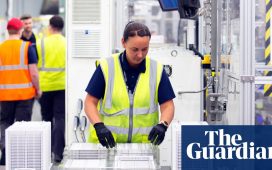Tesla investors are bracing for evidence of declining global demand this week as the electric carmaker battles headwinds including a consumer backlash against its chief executive, Elon Musk.
On 2 April, the US company will release data for first-quarter deliveries – a proxy for sales – that is expected to show a dip on the same period last year. The figures follow global protests on Saturday against Musk and Tesla, targeting the carmaker’s showrooms.
Analysts have been lowering their forecasts amid evidence that Musk’s senior role in the Trump administration has damaged the Tesla brand.
Dan Ives, managing director at the US financial firm Wedbush Securities and a self-avowed Tesla “core bull”, forecast deliveries to come in at between 355,000 and 360,000, a fall of 7% on the same period last year and down from initial predictions across Wall Street of 400,000.
Ives, who recently warned investors that Tesla was facing a “brand tornado crisis moment”, said 30% of the anticipated decline was due to brand damage associated with Musk and his involvement in the so-called department of government efficiency (Doge). The advisory body has targeted federal agencies with cost-cutting policies and redundancies.
Other issues affecting Tesla’s figures during the first three months of the year include consumers waiting for an update to the top-selling Model Y. The US is Tesla’s biggest market.
In a note to investors last week, Ives said that while “much of this softness is related to customers waiting for Model Y refreshes along with a lower-cost new model set to be launched by the summer … the anti-Musk and brand issues are clearly at play”.
Matthias Schmidt, a Berlin-based electric car analyst, said Musk was “hitting his liberal consumer demographic exactly where it hurts”.
“He has become the core toxic issue behind the disintegration of the brand and should step-aside before it explodes like one of his rockets,” added Schmidt, who is expecting first-quarter deliveries in western Europe to come in at just under 70,000 for the first time since the end of 2022.
after newsletter promotion
Among Tesla owners, the Democrat owner group has fallen from 40% during the Biden administration to 29% now, with the Republican group averaging about 30% since 2021, according to market research firm Strategic Vision.
Last week, Donald Trump announced a 25% tariff on cars from overseas, with Tesla also expecting to be affected despite making its cars for the US market in America. The company imports some parts for its US-made cars. Last week, Musk wrote on X, his social media platform, that Tesla is “not unscathed” by tariffs. He added: “The tariff impact on Tesla is still significant.”
The tariffs threaten to plunge the global auto industry into “pure chaos”, according to Ives. “Every auto maker in the world will have to raise prices in some form selling into the US and the supply chain logistics of this tariff announcement heard around the world is hard to even put our arms around at this moment,” he said in a note to investors last week.
However, on Saturday, Trump said he “couldn’t care less” if carmakers raise prices in response to the tariffs on foreign-made vehicles. Indeed, the US president told NBC News that he hoped foreign carmakers raise prices as it means “people are gonna buy American-made cars. We have plenty.”











